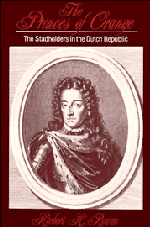Book contents
- Frontmatter
- Contents
- List of illustrations
- Preface
- Prologue: lieutenants of the crown
- 1 William I: from courtier to rebel
- 2 Maurice of Nassau: defender of the Republic
- 3 Frederick Henry: firm in moderation
- 4 William II: the challenger
- 5 The first stadholderless period: 1 exclusion
- 6 The first stadholderless period: 2 return
- 7 William III: stadholder and king
- 8 The second stadholderless period: doldrums
- 9 William IV: neither revolutionary nor reformer
- 10 William V: the era of Anna and Brunswick
- 11 William V: the Patriot challenge
- Epilogue: consequences and conclusions
- Bibliography
- Index
- Title in series
7 - William III: stadholder and king
Published online by Cambridge University Press: 01 June 2011
- Frontmatter
- Contents
- List of illustrations
- Preface
- Prologue: lieutenants of the crown
- 1 William I: from courtier to rebel
- 2 Maurice of Nassau: defender of the Republic
- 3 Frederick Henry: firm in moderation
- 4 William II: the challenger
- 5 The first stadholderless period: 1 exclusion
- 6 The first stadholderless period: 2 return
- 7 William III: stadholder and king
- 8 The second stadholderless period: doldrums
- 9 William IV: neither revolutionary nor reformer
- 10 William V: the era of Anna and Brunswick
- 11 William V: the Patriot challenge
- Epilogue: consequences and conclusions
- Bibliography
- Index
- Title in series
Summary
No Prince of Orange before William III had become stadholder at a more difficult and dangerous time. The French army had plunged ahead to the very center of the country, taking Utrecht late in June, and the way seemed open to Amsterdam and The Hague, only twenty-one and thirty-three miles away. In the North the bishop of Münster, von Galen, who hated the Dutch with all his heart for cheating him of his territorial gains in 1665, had the city of Groningen under siege; if he took it, he could make good his territorial claims in Drente and Overijssel. All of Overijssel, Gelderland and Utrecht provinces were occupied by the enemy, although far to the south the great fortress of Maastricht, which the French had bypassed during their march to the Rhineland, held out. In Holland and Zeeland, the core provinces, civil authority seemed shattered by the turbulence that had brought the Prince of Orange to the stadholderate. And William himself, unlike his great-grandfather exactly a century before, was a novice in both warfare and politics. It was, indeed, a time to try his soul and the souls of his countrymen.
The Dutch defenses, strained though they were to the utmost, held. William's gamble on his future paid off. Until well into July, defeat on the battlefield appeared certain. It was thought so by the French king, who followed on the heels of his army all the way to Utrecht, and by Charles II, even though a combined Anglo-French fleet was defeated by De Ruyter, the Dutch admiral, off the English coast.
- Type
- Chapter
- Information
- The Princes of OrangeThe Stadholders in the Dutch Republic, pp. 131 - 147Publisher: Cambridge University PressPrint publication year: 1988



